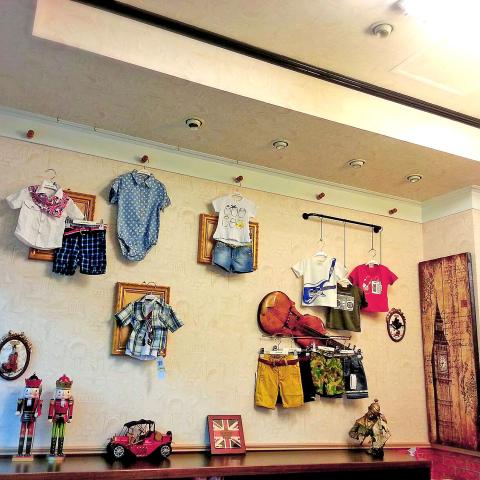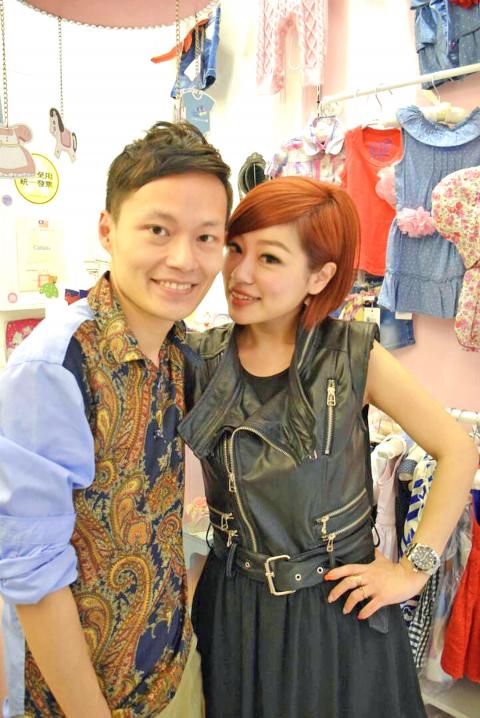In May last year, three young local entrepreneurs created a baby clothing brand, Prano Kids, that aims to become a global player in the children’s apparel market.
Although it is a newcomer, the startup aims to make Prano Kids the preferred baby apparel brand in Taiwan within five years.
This may seem a rather ambitious goal for a fledgling company, but achieving it would be only the latest chapter in the rise of the children’s clothing wholesaler that founded Prano Kids, who just a year ago was one of dozens in Taipei’s Wufenpu (五分埔) Garment Wholesale Area.

Photo courtesy of Prano Kids
“The essence of our brand is to design clothing that combines comfort with style,” brand designer and core leader Cherry Lin (林怡瑄) told the Taipei Times.
Lin said that Taiwan’s baby clothing market is polarizing because most domestic clothing brands are plastered with cartoon characters, while others make kids clothes that resemble adult’s and completely miss the comfort element.
Prano Kids aims to fill the gap in the market for baby apparel that is comfortable, stylish and affordable, with each piece priced at about NT$1,000, she said, adding that it is targeting babies from three months to three years old.

Photo: Amy Su, Taipei Times
Since Lin never studied fashion or design, she had to start her journey to making her ideas into reality from scratch.
The concept of the Prano Kids brand was spurred into being when Cherry Lin’s elder brother, Liston Lin (林明杰), helped her found the company.
Liston Lin has worked in the luxury industry in France for 10 years and specializes in luxury brand management, a bank of experience he says has given him a unique perception on the aesthetics of clothing design.
He says he uses this experience to enhance the brand’s design and quality, as its creative director.
“I always share my thoughts and inspirations on baby clothing with my sister, hoping that will inspire her designs. I think that my observations about children’s clothing and brands in France can contribute greatly to Prano Kids,” said Liston Lin, who resides in Paris, where he works in the fine jewelry department at Louis Vuitton SA.
The siblings believe that the quality of the materials used is the most important factor in the manufacture of baby clothes, so they use only combed and mercerized cotton to produce their clothes.
Both types of cottons are all-natural fabrics that are not subjected to any chemical processing.
To ensure high product quality, Cherry Lin and a partner from Hong Kong invested NT$4 million to NT$5 million (US$133,000 to US$166,000) to construct a clothing plant in Guangzhou, China, to manufacture products for the line.
Cherry Lin said that her vision for investment and brand positioning comes from the five years she spent working in the retail and wholesale industries.
She first entered the retail sector five years ago after quitting her job as an office administrator to invest in a women’s apparel shop in Taipei.
In January 2010, Cherry Lin and a friend opened their first baby clothing wholesale shop, Lan Kwai Fong (蘭桂坊童裝批發), in the Wufenpu area. They opened a second store, Catasy (卡特思童裝批發), in March last year.
“The two stores generated about NT$50 million in sales last year,” Cherry Lin said.
The wholesale outlets sell products made in factories in China, as well as South Korean clothing that Cherry Lin and her partner bring back from their periodic scouting visits to Seoul.
Although her stores were performing well, Cherry Lin still decided to take the risk of launching her own brand because she said she was finding it increasingly difficult to stock the outlets with products that meet her expectations.
She said she does not feel that developing clientele will be an issue for Prano Kids, since she and her partner have built up solid rapport with the customers of their wholesale units.
The two outlets boast about 300 retail clients, among which is well-known local mom and baby care shop Angel Baby Inc (安琪兒嬰婦百貨), she said.
However, she does anticipate that it will be a challenge to sell Prano Kids clothing to retail clients since the brand is new and therefore unknown.
In an effort to minimize this potential problem, Cherry Lin registered the Prano Kids brand in the EU.
Getting that certification will take about nine months and cost her more than NT$100,000, but the document would make Prano Kids a European brand, which Lin says would not only serve to assure customers of product quality, it would also open the door for the brand to expand overseas.
To expand sales channels for Prano Kids, Cherry Lin launched a third wholesale outlet at the Tianjin Road (天津路) Garment Wholesale Area in Greater Taichung last month.
To boost sales and brand awareness, she also plans to sell Prano Kids clothes on the Internet through PChome Online and Yahoo! Shopping starting later this year.
Cherry Lin said she expects the revenue contributed by Prano Kids to account for 70 percent of her wholesale and retail businesses in five years, from 30 percent now.
From retailing and wholesaling, to occupying an upstream role a designer and manufacturer, Cherry Lin’s ultimate goal is to make Prano Kids a major “made in Taiwan” brand that can compete with the baby clothing departments of world-renowned cheap-and-chic chains like Uniqlo, Zara and Gap.

SEEKING CLARITY: Washington should not adopt measures that create uncertainties for ‘existing semiconductor investments,’ TSMC said referring to its US$165 billion in the US Taiwan Semiconductor Manufacturing Co (TSMC, 台積電) told the US that any future tariffs on Taiwanese semiconductors could reduce demand for chips and derail its pledge to increase its investment in Arizona. “New import restrictions could jeopardize current US leadership in the competitive technology industry and create uncertainties for many committed semiconductor capital projects in the US, including TSMC Arizona’s significant investment plan in Phoenix,” the chipmaker wrote in a letter to the US Department of Commerce. TSMC issued the warning in response to a solicitation for comments by the department on a possible tariff on semiconductor imports by US President Donald Trump’s

‘FAILED EXPORT CONTROLS’: Jensen Huang said that Washington should maximize the speed of AI diffusion, because not doing so would give competitors an advantage Nvidia Corp cofounder and chief executive officer Jensen Huang (黃仁勳) yesterday criticized the US government’s restrictions on exports of artificial intelligence (AI) chips to China, saying that the policy was a failure and would only spur China to accelerate AI development. The export controls gave China the spirit, motivation and government support to accelerate AI development, Huang told reporters at the Computex trade show in Taipei. The competition in China is already intense, given its strong software capabilities, extensive technology ecosystems and work efficiency, he said. “All in all, the export controls were a failure. The facts would suggest it,” he said. “The US

The government has launched a three-pronged strategy to attract local and international talent, aiming to position Taiwan as a new global hub following Nvidia Corp’s announcement that it has chosen Taipei as the site of its Taiwan headquarters. Nvidia cofounder and CEO Jensen Huang (黃仁勳) on Monday last week announced during his keynote speech at the Computex trade show in Taipei that the Nvidia Constellation, the company’s planned Taiwan headquarters, would be located in the Beitou-Shilin Technology Park (北投士林科技園區) in Taipei. Huang’s decision to establish a base in Taiwan is “primarily due to Taiwan’s talent pool and its strength in the semiconductor

French President Emmanuel Macron has expressed gratitude to Hon Hai Precision Industry Co (鴻海精密) for its plan to invest approximately 250 million euros (US$278 million) in a joint venture in France focused on the semiconductor and space industries. On his official X account on Tuesday, Macron thanked Hon Hai, also known globally as Foxconn Technology Group (富士康科技集團), for its investment projects announced at Choose France, a flagship economic summit held on Monday to attract foreign investment. In the post, Macron included a GIF displaying the national flag of the Republic of China (Taiwan), as he did for other foreign investors, including China-based